CDC – Infection Control for Viral Hemorrhagic Fevers in African Healthcare Setting
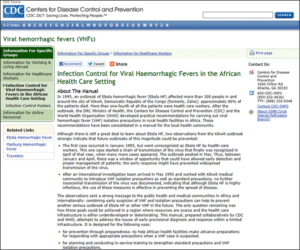 From the CDC, information about infection control for viral hemorrhagic fevers in Africa.
From the CDC, information about infection control for viral hemorrhagic fevers in Africa.
 From the CDC, information about infection control for viral hemorrhagic fevers in Africa.
From the CDC, information about infection control for viral hemorrhagic fevers in Africa.
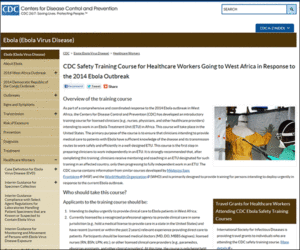 Information about an introductory training course for health care professionals intending to travel to West Africa to aid in the Ebola outbreak. Learn more.
Information about an introductory training course for health care professionals intending to travel to West Africa to aid in the Ebola outbreak. Learn more.
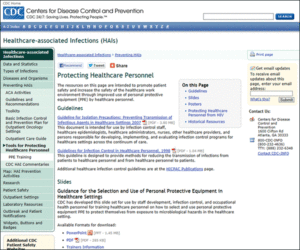 Guidelines for protecting healthcare personnel from the CDC.
Guidelines for protecting healthcare personnel from the CDC.
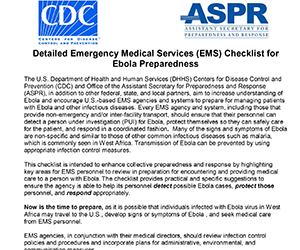 This checklist is intended to enhance collective preparedness and response by highlighting key areas for EMS personnel to review in preparation for encountering and providing medical care to a person with Ebola. The checklist provides practical and specific suggestions to ensure the agency is able to help its personnel detect possible Ebola cases, protect those personnel, and respond appropriately.
This checklist is intended to enhance collective preparedness and response by highlighting key areas for EMS personnel to review in preparation for encountering and providing medical care to a person with Ebola. The checklist provides practical and specific suggestions to ensure the agency is able to help its personnel detect possible Ebola cases, protect those personnel, and respond appropriately.
Detailed Emergency Medical Services (EMS) Checklist for Ebola Preparedness
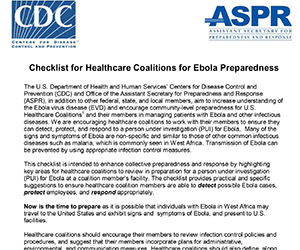 This checklist is intended to enhance collective preparedness and response by highlighting key areas for healthcare coalitions to review in preparation for a person under investigation (PUI) for Ebola at a coalition member’s facility. The checklist provides practical and specific suggestions to ensure healthcare coalition members are able to detect possible Ebola cases, protect employees, and respond appropriately.
This checklist is intended to enhance collective preparedness and response by highlighting key areas for healthcare coalitions to review in preparation for a person under investigation (PUI) for Ebola at a coalition member’s facility. The checklist provides practical and specific suggestions to ensure healthcare coalition members are able to detect possible Ebola cases, protect employees, and respond appropriately.
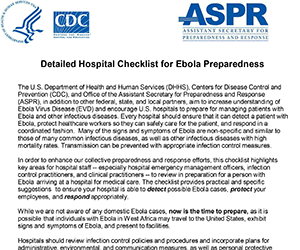 In order to enhance our collective preparedness and response efforts, this checklist highlights key areas for hospital staff – especially hospital emergency management officers, infection control practitioners, and clinical practitioners – to review in preparation for a person with Ebola arriving at a hospital for medical care. The checklist provides practical and specific suggestions to ensure your hospital is able to detect possible Ebola cases, protect your employees, and respond appropriately.
In order to enhance our collective preparedness and response efforts, this checklist highlights key areas for hospital staff – especially hospital emergency management officers, infection control practitioners, and clinical practitioners – to review in preparation for a person with Ebola arriving at a hospital for medical care. The checklist provides practical and specific suggestions to ensure your hospital is able to detect possible Ebola cases, protect your employees, and respond appropriately.
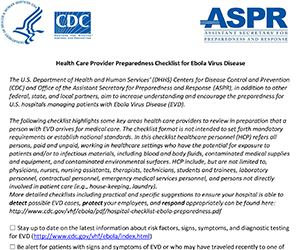 This checklist highlights some key areas health care providers to review in preparation that a person with EVD arrives for medical care. The checklist format is not intended to set forth mandatory requirements or establish national standards. In this checklist healthcare personnel (HCP) refers all persons, paid and unpaid, working in healthcare settings who have the potential for exposure to patients and/or to infectious materials, including blood and body fluids, contaminated medical supplies and equipment, and contaminated environmental surfaces. HCP include, but are not limited to, physicians, nurses, nursing assistants, therapists, technicians, students and trainees, laboratory personnel, contractual personnel, emergency medical services personnel, and persons not directly involved in patient care (e.g., house-keeping, laundry).
This checklist highlights some key areas health care providers to review in preparation that a person with EVD arrives for medical care. The checklist format is not intended to set forth mandatory requirements or establish national standards. In this checklist healthcare personnel (HCP) refers all persons, paid and unpaid, working in healthcare settings who have the potential for exposure to patients and/or to infectious materials, including blood and body fluids, contaminated medical supplies and equipment, and contaminated environmental surfaces. HCP include, but are not limited to, physicians, nurses, nursing assistants, therapists, technicians, students and trainees, laboratory personnel, contractual personnel, emergency medical services personnel, and persons not directly involved in patient care (e.g., house-keeping, laundry).
Health Care Provider Preparedness Checklist for Ebola Virus Disease
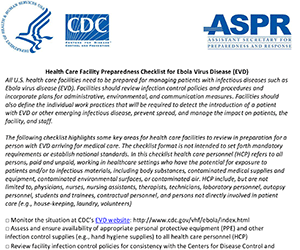 This checklist highlights some key areas for health care facilities to review in preparation for a person with EVD arriving for medical care. The checklist format is not intended to set forth mandatory requirements or establish national standards. In this checklist health care personnel (HCP) refers to all persons, paid and unpaid, working in healthcare settings who have the potential for exposure to patients and/or to infectious materials, including body substances, contaminated medical supplies and equipment, contaminated environmental surfaces, or contaminated air. HCP include, but are not limited to, physicians, nurses, nursing assistants, therapists, technicians, laboratory personnel, autopsy personnel, students and trainees, contractual personnel, and persons not directly involved in patient care (e.g., house-keeping, laundry, volunteers)
This checklist highlights some key areas for health care facilities to review in preparation for a person with EVD arriving for medical care. The checklist format is not intended to set forth mandatory requirements or establish national standards. In this checklist health care personnel (HCP) refers to all persons, paid and unpaid, working in healthcare settings who have the potential for exposure to patients and/or to infectious materials, including body substances, contaminated medical supplies and equipment, contaminated environmental surfaces, or contaminated air. HCP include, but are not limited to, physicians, nurses, nursing assistants, therapists, technicians, laboratory personnel, autopsy personnel, students and trainees, contractual personnel, and persons not directly involved in patient care (e.g., house-keeping, laundry, volunteers)
Health Care Facility Preparedness Checklist for Ebola Virus Disease
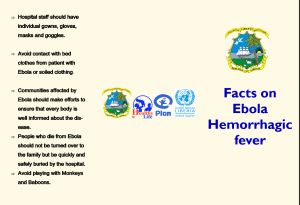 http://www.unicef.org/cbsc/files/Ebola_Brochure-Liberia-EN.pdf
http://www.unicef.org/cbsc/files/Ebola_Brochure-Liberia-EN.pdf
This pamphlet explains what Ebola is, how it is spread, its signs and symptoms, and how it can be prevented. It directs information to community members as well as to health workers.
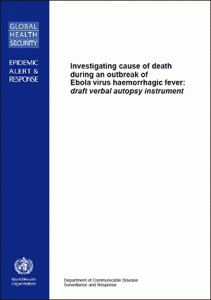 World Health Organization report presenting a draft verbal autopsy instrument based on best judgement and previous experience in a variety of settings including outbreaks and research. It is part of a wider effort by the Global Outbreak Alert and Response Network (GOARN) to develop tools for testing in advance of outbreak situations. The report also contains information on how to carry out a validation study, which compares the results of a verbal autopsy questionnaire with the results of a “gold standard” – such as laboratory test or clinical diagnosis. To date, there is no standard, verbal autopsy instrument for use during outbreaks of Ebola virus haemorrhagic fever (EHF).
World Health Organization report presenting a draft verbal autopsy instrument based on best judgement and previous experience in a variety of settings including outbreaks and research. It is part of a wider effort by the Global Outbreak Alert and Response Network (GOARN) to develop tools for testing in advance of outbreak situations. The report also contains information on how to carry out a validation study, which compares the results of a verbal autopsy questionnaire with the results of a “gold standard” – such as laboratory test or clinical diagnosis. To date, there is no standard, verbal autopsy instrument for use during outbreaks of Ebola virus haemorrhagic fever (EHF).

The Ebola Communication Network was originally developed by the Health Communication Capacity Collaborative (Cooperative Agreement #AID-OAA-A-12-00058) and expanded under Breakthrough ACTION (Cooperative Agreement #AID-OAA-A-17-00017) both under the leadership of Johns Hopkins Center for Communication Programs. This website is now maintained by Johns Hopkins Center for Communication Programs and its contents are the sole responsibility of CCP. The contents of this website do not necessarily reflect the views of USAID, the United States Government, or Johns Hopkins University.
